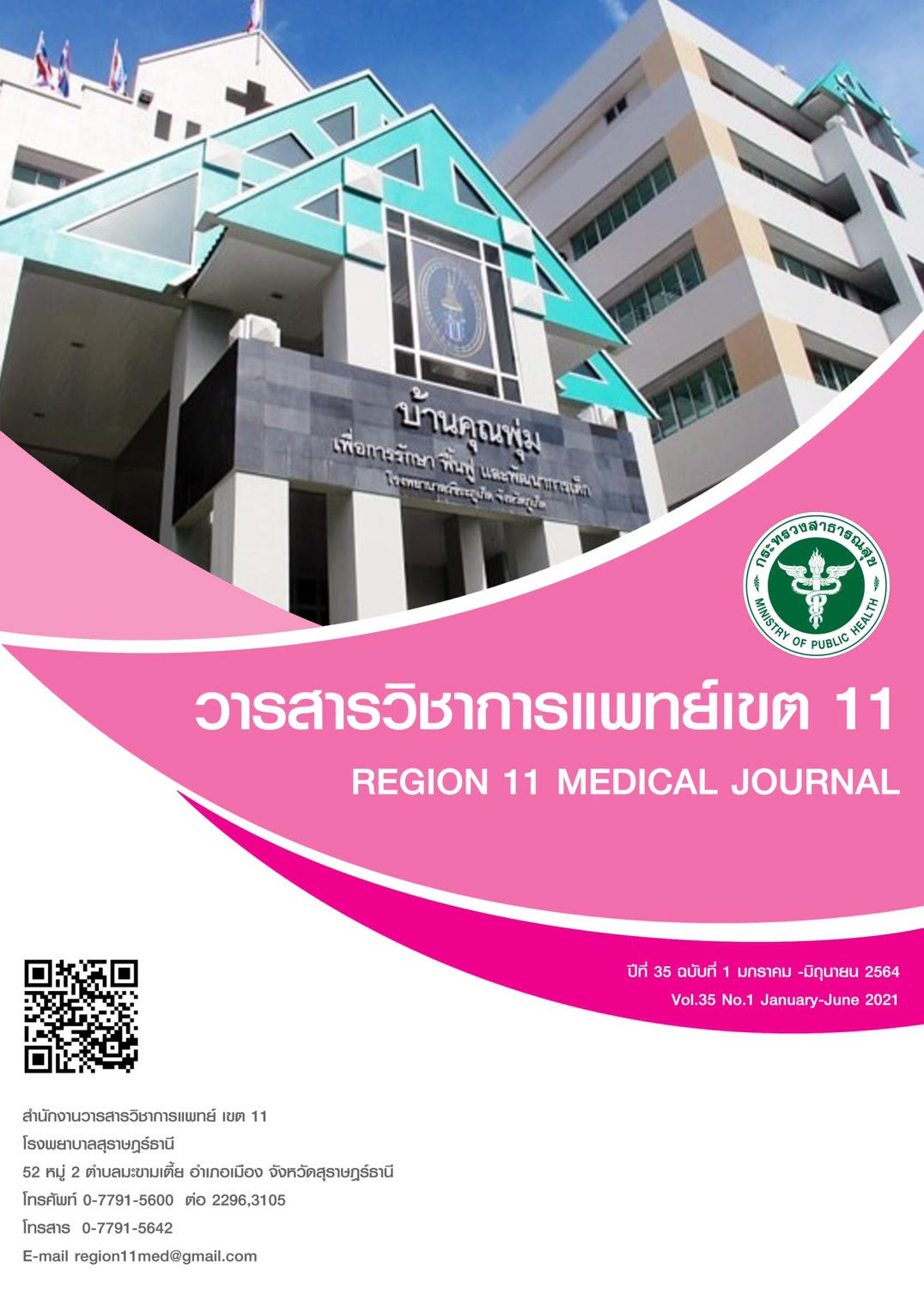Evaluation of the Benefit of Intraoperative Frozen Section Analysis of Sentinel Lymph Nodes in Clinically Negative Node Early Breast Cancer after ACOSOG Z0011 Era
Keywords:
early breast cancer, frozen section, sentinel lymph nodeAbstract
Background: Sentinel lymph node (SLN) biopsy (SLNB) is the standard practice for patients with clinically negative axillary lymph node. Frozen section was used to reduce the rate of re-operation in the case of sentinel lymph node (SLN) positive. From ACOSOG Z0011 and AMAROS trials, they supported that axillary lymph node dissection (ALND) can be omitted in selected patients. Globally, frozen section has been decreased significantly.
Objective: To determine the re-operative rate in the patient that limited SLN metastasis treated following ACOSOG Z0011 and determine factors that associated with metastatic involvement of axillary lymph nodes (ALN).
Material and Method: Patients who diagnosed early breast cancer with clinically node negative were retrospectively reviewed. All patients were initial treated with total mastectomy, lumpectomy, ALND and SLNB from 2014 to 2018 were collected. Demographic data was recorded, re-operative was calculated and the risk of metastasis to ALN were analyzed in relation to clinicopathological determinants.
Result: 190 patients were enrolled in this study. 19 patients (10%) required ALND. Factors associated with ALN metastasis in univariate analyses were age >50 year, HER-2 expression, lymphovascular invasion (LVI), and extra nodal extension. All factors identified with univariate analyses were entered into a multivariate logistic regression model and HER-2 expression (OR=2.42, p=0.006), LVI (OR=3.53, p<0.001) and extra nodal extension (OR=8.11, p= 0.008) remained as independent factors of ALN metastasis.
Conclusion: The chances of having to re-operation are relatively low following ACOSOG Z0011. HER-2 expression, LVI and extra nodal extension are factors that associated with ALN metastasis in patient with early breast cancer.
References
Bray F, Ferlay J, Soerjomataram I, Siegel RL, Torre LA, Jemal A. Global cancer statistics 2018: GLOBOCAN estimates of incidence and mortality worldwide for 36 cancers in 185 countries. CA Cancer J Clin. 2018;68(6):394–424.
Charles B, Dana K, Timothy R, David L, John G, Jeffrey B, Raphael E. Schwartz textbook of surgery 10th edition. Los Angelis: McGraw-Hill Education / Medical; 2014.
Jay R. Harris, Marc E. Lippman, Monica Morrow, C. Kent Osborne. Diseases of the breast Fifth edition. Philadelphia: Wolters Kluwer Health; 2014
Courtney M, Townsend R, Daniel B, Mark E, Kenneth L. Sabiston textbook of surgery 20th edition. Philadelphia: Elsevier; 2017.
Giuliano AE, McCall L, Beitsch P, et al. Locoregional recurrence after sentinel lymph node dissection with or without axillary dissection in patients with sentinel lymph node metastases: the American College of Surgeons Oncology Group Z0011 randomized trial. Ann Surg. 2010; 252:426–32.
Giuliano AE, Hawes D, Ballman KV, et al. Association of Occult Metastases in Sentinel Lymph Nodes and Bone Marrow With Survival Among Women With Early-Stage Invasive Breast Cancer. JAMA. 2011;306:385-93.
Giuliano AE, Hunt KK, Ballman KV, et al. Axillary dissection vs no axillary dissection in women with invasive breast cancer and sentinel node metastasis: a randomized clinical trial. JAMA. 2011;305:569-75.
The American Society of Breast Surgeons position statement on management of the axilla in patients with invasive breast cancer. Available at http://www.breastsurgeons.org/statements/PDF_Statements/Axillary_Management.pdf. Accessed 26 February, 2014
Donker M, van Tienhoven G, Straver ME, et al. Radiotherapy or surgery of the axilla after a positive sentinel node in breast cancer (EORTC 10981- 22023 AMAROS): a randomised, multicentre, openlabel, phase 3 non-inferiority trial. Lancet Oncol 2014;15:1303-10.
Barakat FH, Sulaiman I, Sughayer MA. Reliability of frozen section in breast sentinel lymph node examination. Breast Cancer. 2014; 21(5): 576-82.
Lyman GH, Temin S, Edge SB, et al. Sentinel lymph node biopsy for patients with early-stage breast cancer: American Society of Clinical Oncology clinical practice guideline update. J Clin Oncol. 2014;32(13):1365–83.
Bishop JA, Sun J, Ajkay N, Sanders MAG. Decline in Frozen Section Diagnosis for Axillary Sentinel Lymph Nodes as a Result of the American College of Surgeons Oncology Group Z0011 Trial. Arch Pathol Lab Med. 2016;140(8):830–5.
Caudle AS, Hunt KK, Tucker SL, et al. American College of Surgeons Oncology Group (ACOSOG) Z0011: impact on surgeon practice patterns. Ann Surg Oncol. 2012;19(10):3144–51.
Wright GP, Mater ME, Sobel HL, et al. Measuring the impact of the American College of Surgeons Oncology Group Z0011 trial on breast cancer surgery in a community health system. Am J Surg. 2015;209(2):240–5.
Malik AA, Urooj N, Shamim R, Salim M, Bano R, Chaudhry Z, et al. Managing the Axilla in Early Breast Cancer. Impact of ACOSOG Z0011 Trial in Changing Practices in a Low Middle Income Country. Asian Pac J Cancer Prev [Internet]. 2017;18(8).
Sandoughdaran S, Malekzadeh M, Akbari ME. Frequency and Predictors of Axillary Lymph Node Metastases in Iranian Women with Early Breast Cancer. Asian Pac J Cancer Prev [Internet]. 2018;19(6).
Xie F, Yang H, Wang S, Zhou B, Tong F, Yang D, et al. A Logistic Regression Model for Predicting Axillary Lymph Node Metastases in Early Breast Carcinoma Patients. Sensors. 2012 Jul 23;12(7):9936–50.
Majid S, Rydén L, Manjer J. Predictive factors for sentinel node metastases in primary invasive breast cancer: a population-based cohort study of 2552 consecutive patients. World J Surg Onc. 2018 Dec;16(1):54.
Karahallı Ö, Acar T, Atahan MK, Acar N, Hacıyanlı M, Kamer KE. Clinical and Pathological Factors Affecting the Sentinel Lymph Node Metastasis in Patients with Breast Cancer. Indian J Surg. 2017 Oct;79(5):418–22.
Kurnaz E, Celebi B, Karapolat B, Eken H, Kucuktulu U. Risk factors for axillary lymph node metastasis in breast cancer. Ann Med Res. 2019;26(10):2139.
Downloads
Published
How to Cite
Issue
Section
License
Copyright (c) 2021 Region11Medical Journal

This work is licensed under a Creative Commons Attribution-NonCommercial-NoDerivatives 4.0 International License.






